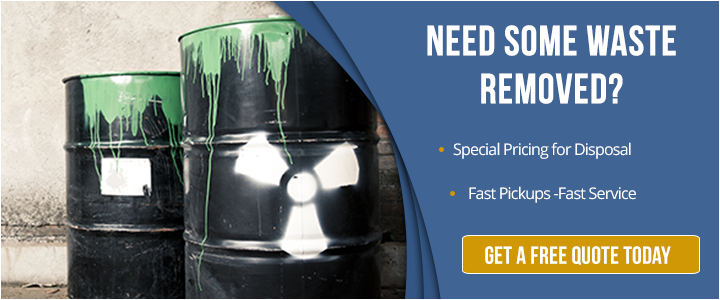If your business generates hazardous waste, one of the worst mistakes you could make is improper disposal.
It is illegal in California to dispose of hazardous waste in the trash, down the drain or by abandoning it. Doing so can harm the environment, lead to substantial fines and give your public image a black eye.
While it’s clear what you can’t do with your hazardous waste, what can you do with it?
Hazardous Waste Collection Facilities
In California, hazardous waste collection facilities offer an option for those who are determining where to dispose of hazardous waste. There are several of these facilities throughout the state, and these are the only regulated facilities that are allowed to treat, store or dispose of this type of waste.
those who are determining where to dispose of hazardous waste. There are several of these facilities throughout the state, and these are the only regulated facilities that are allowed to treat, store or dispose of this type of waste.
However, simply loading up your facility’s hazardous waste and transporting it to one of these sites opens you up to other types of violations. In California, it is against the law for any person to transport hazardous waste.
The only individuals who may transport hazardous waste are those who hold a valid registration, and the Department of Toxic Substances Control (DTSC) must issue this registration. In California, it does not matter if you are a large vs. small hazardous waste generator when it comes to hazardous waste transport requirements.
While how much hazardous waste your facility generates can impact other requirements, such as personnel training and storage, this differentiation does not impact transport requirements. (The Department of Toxic Substances Control outlines the differences in this California Hazardous Waste Generator Summary Chart.)
Another point to keep in mind why it’s easier to transport hazardous waste to a collection facility is that each hazardous waste facility accepts different types of waste.
While some accept electronic waste, others may only accept medical waste or industrial waste like oils, solvents and toxic chemicals. Only certain facilities accept items like batteries, paint, paint thinner, pesticides, motor oils, fluorescent lights, asbestos and other toxic products. Each facility typically limits on how much of that waste it can accept during drop-offs.
Hazardous Waste Brokers
For most facilities, dropping off their hazardous waste at designated collection sites around the state isn’t feasible, not to mention illegal. Drop-off sites typically serve household generators or receive a company’s waste via registered transporters.
collection sites around the state isn’t feasible, not to mention illegal. Drop-off sites typically serve household generators or receive a company’s waste via registered transporters.
That means many businesses must work with another company to legally transport their hazardous waste off-site to the proper collection facilities.
You have two choices when it comes to transporting your waste:
- Work with a hazardous waste broker
- Work directly with a hazardous waste disposal company
Let’s take a closer look at the first choice and why hazardous waste brokers are NOT the best choice for most companies.
Despite similar names, a hazardous waste broker is NOT the same as a hazardous waste transporter. Brokers typically do not own a hazardous waste transportation business. Instead, they act as a middleman between the buyer (you) and the transportation company that takes your waste to a disposal site.
Companies like yours often come across brokers when searching for a company online to provide you with a quote to dispose of your toxic materials.
What you may not realize is that the company you are corresponding with is a broker, which receives your request and then starts calling hazardous waste transportation companies to get a price from them for your disposal.
Sounds good, right? Not so fast. A broker will take the quoted price and then mark it up with whatever percentage it wants before submitting the quote to you for approval. In the end, you will pay more for a service you could receive directly from a waste transportation company.
Even worse, you lose control over who is handling your waste. You have no way to know who the broker is using to transport your waste to a disposal site. That means you run the risk of the broker using a waste transportation company with a poor reputation or worse, an unlicensed transportation company.
And if something goes wrong during the transport, your business is at risk due to cradle to grave requirements. Cradle to grave means you, as the generator, are responsible for waste from the moment it is generated to ultimate disposal.
Hazardous waste brokers also don’t need qualifications to sell you disposal services. In fact, they may have no experience in hazardous waste disposal whatsoever.
It’s better to work directly with a certified hazardous waste disposal company directly, which we’ll explore below.
Hazardous Waste Disposal Companies
When you work directly with a hazardous waste disposal company, you can better ensure your business complies with and meets all regulations.
In addition to transporting your waste, the best disposal companies will:
- Help you establish a waste management plan that covers all areas of your operations
- Identify uncertain waste streams through profiling and testing to ensure the right facilities receive the right hazardous materials
- Evaluate your waste streams to determine if the waste could be classified as non-hazardous waste, possibly saving you money on your disposal fees
- Develop site-specific plans that include training and emergency preparation
- Prepare manifests and other required paperwork needed for transport
- Offer evidence that your waste has been properly disposed of at the treatment and disposal facility
- Provide a hazardous waste walk-through program that evaluates your waste procedures and catches potential issues before they become costly mistakes
When evaluating disposal companies you should work with, it’s also important to look at the qualifications of the company and its staff.
For example, a waste transporter should pass all background checks, including checking state and federal licenses (Motor Carrier Permit, DOT Hazardous Material License, DTSC Transporter Registration, etc.).
A transporter should also have a great reputation. Ask for contact information of clients the disposal company has worked with so that you can hear about their experiences first-hand.
Finally, the disposal company you work with should be knowledgeable about the type of waste that you generate. The disposal of different types of hazardous wastes must adhere to specific regulations. States also have different laws, so if your waste is being transported across state lines, it’s critical that your disposal company is aware of all laws pertaining to your type of waste in every state it travels.
Working with a licensed, experienced hazardous waste disposal company - NOT a broker - can provide reassurance that your communities are safe and that your waste and company are in good hands.


Comment